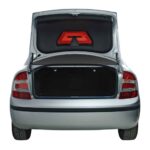Understanding the term “cables” in English is essential, especially for automotive professionals. While seemingly simple, “cable” encompasses a variety of meanings, each crucial in different contexts. This guide will clarify the various English translations of “cable,” ensuring precision in your automotive repairs and diagnostics.
In English, “cable” can translate to several terms depending on the specific type and function you’re referring to. Primarily, when we talk about “cables” in an automotive context, we often mean wires or electrical cables. These are conductors, typically made of copper or aluminum, used to carry electrical current. Think of the wiring within a car’s electrical system – these are “cables” in the sense of electrical wires. You might hear phrases like “wiring harness cables” referring to these complex systems.
However, “cable” in English isn’t limited to just electrical conductors. It can also refer to a strong, thick rope made of steel or fiber. While less common in everyday automotive repair talk, it’s important to recognize this meaning. For example, a tow cable, used for pulling vehicles, is a “cable” in this sense – a robust rope-like structure.
Furthermore, “cable” also has historical connotations. In older English, “cable” could refer to a telegram or cablegram, a message sent via submarine telegraph cables. While this usage is largely outdated, it’s a part of the word’s history and may appear in older texts.
Let’s break down the different types of “cables” you might encounter in automotive repair and related fields:
-
Electrical Cables/Wires: This is perhaps the most frequent use in automotive contexts. These “cables” are insulated wires that carry electrical signals and power. They are crucial for everything from powering headlights to transmitting data in modern vehicle systems. When someone says “check the cable,” they often mean an electrical wire or cable.
-
Battery Cables: Specifically designed to carry high current, battery cables connect the car battery to the starter and the vehicle’s electrical system. These are heavy-duty “cables” essential for starting the engine.
-
Jumper Cables/Booster Cables: Used to jump-start a car with a dead battery, these are another type of electrical cable, designed for temporary high-current transfer between vehicles.
-
Coaxial Cable: While less directly related to general auto repair, coaxial cables are used for transmitting radio frequency signals, and might be found in car antennas or older vehicle communication systems. In broader terms, coaxial cables are known for their ability to carry television signals – “cable television” or “cable TV” uses coaxial cables.
-
Ground Cables: These are crucial for safety in electrical systems, providing a path for fault currents to the earth. In vehicles, ground cables ensure proper grounding of components to the chassis.
It’s also worth noting some common phrases and compound words using “cable”:
- Cable TV/Cable Television: Referring to television services delivered via cable, not relevant to auto repair but part of the broader understanding of “cable.”
- Cable Length: Describing the length of any type of cable, important when choosing replacement parts.
- Cable-ready: Often used in electronics, indicating compatibility with cable television systems.
- Power Cable: Specifically an electrical cable designed to supply power.
In conclusion, while “Cables En Ingles” primarily translates to “cables in English,” understanding the nuances is key. In automotive repair, “cables” most often refers to electrical wires and cables, essential for the vehicle’s operation. However, it’s important to be aware of the other meanings, such as strong ropes and historical usages, to fully grasp the English language and communicate effectively in a globalized automotive industry. Familiarity with these different uses of “cables” will enhance your expertise and ensure clarity in diagnostics and repairs within the automotive field.
